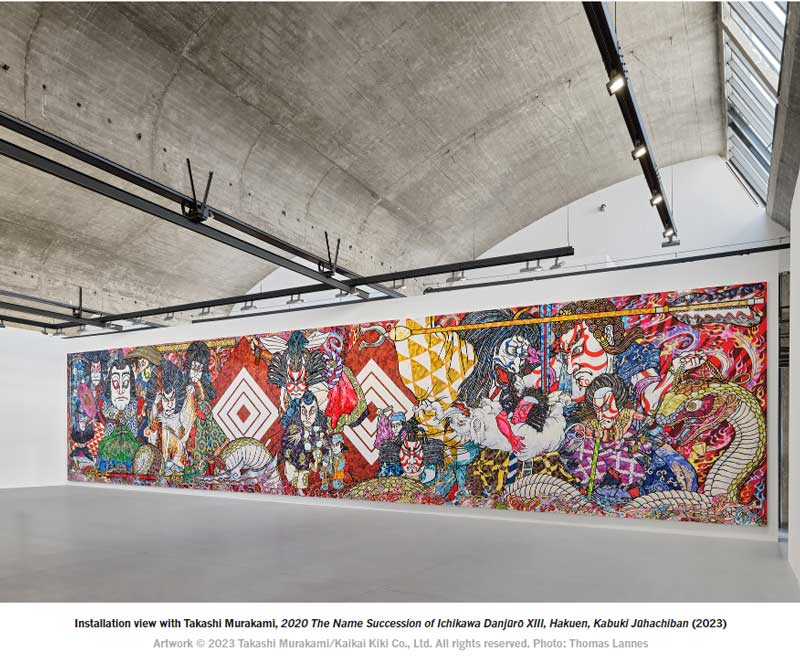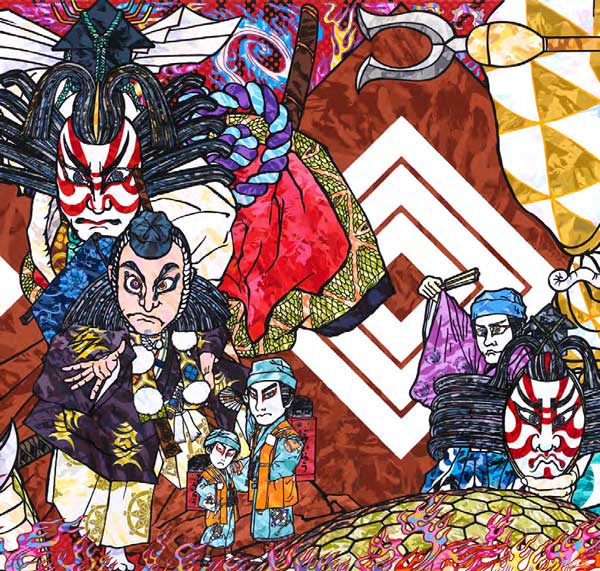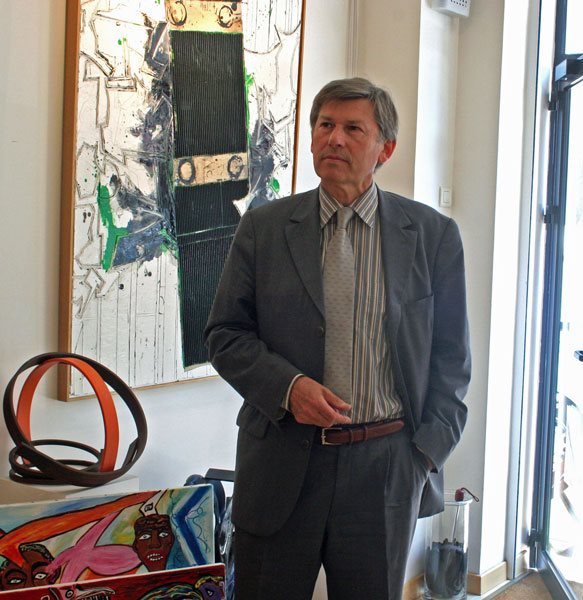|
L’exposition présente également une autre peinture de grand format, Dragon in Clouds – Indigo Blue (2010), que Murakami a réalisée en réponse à l’oeuvre Dragon and Clouds (1763) de l’artiste japonais excentrique du XVIIIe siècle Soga Shoˉhaku. L’oeuvre de Shoˉhaku est une peinture Unryu¯zu (nuage et dragon) composée de plusieurs panneaux dans laquelle la créature tutélaire apparaît comme un symbole bouddhiste d’optimisme et de bonne fortune. La peinture de Murakami, comme celle de Shoˉhaku, est composée d’une palette de couleurs restreintes qui s’étend sur plusieurs sections. Les tourbillons graphiques font allusion à l’utilisation expressive de l’encre par Shoˉhaku et suggèrent le vol du dragon, alliant ses narines évasées à ses moustaches serpentines qui évoquent un mouvement turbulent. Dragon in Clouds – Indigo Blue fait également référence à la culture visuelle japonaise contemporaine, et plus particulièrement au jeu vidéo Blue Dragon, tandis que sa vaste échelle réaffirme l’impact visuel et psychologique du chef-d’oeuvre de Shoˉhaku.
 Dans une autre peinture inédite en forme de frise chronologique, Murakami utilise une esthétique évoquant la nostalgie de l’aspect pixellisé des graphiques informatiques des années 1980. Cette oeuvre est inspirée de Pay for Your Pleasure (1988) de Mike Kelley, dans laquelle l’artiste dépeint des portraits de grands artistes et écrivains, accompagnés de citations sur la nature transgressive du génie créatif, aux côtés d’un autoportrait d’un criminel condamné. (Kelley sera l’objet d’une exposition personnelle à la Bourse de commerce à Paris en octobre 2023.) L’oeuvre de Murakami remplace les sujets de Kelley par d’importantes figures de l’économie des derniers millénaires, notamment les Sumériens, Dans une autre peinture inédite en forme de frise chronologique, Murakami utilise une esthétique évoquant la nostalgie de l’aspect pixellisé des graphiques informatiques des années 1980. Cette oeuvre est inspirée de Pay for Your Pleasure (1988) de Mike Kelley, dans laquelle l’artiste dépeint des portraits de grands artistes et écrivains, accompagnés de citations sur la nature transgressive du génie créatif, aux côtés d’un autoportrait d’un criminel condamné. (Kelley sera l’objet d’une exposition personnelle à la Bourse de commerce à Paris en octobre 2023.) L’oeuvre de Murakami remplace les sujets de Kelley par d’importantes figures de l’économie des derniers millénaires, notamment les Sumériens,
Sima Qian, Jean-Baptiste Colbert, Benjamin Franklin, Adam Smith, Karl Marx, John Maynard Keynes, Satoshi Nakamoto, Vitalik Buterin, Elon Musk et la crypto-monnaie Dogecoin, plaçant ces figures sur une ligne temporelle aux couleurs de l’arc-en-ciel. En associant ces acteurs clés des changements économiques mondiaux à des personnages de jeu vidéo, Murakami attire l’attention sur les aspects compétitifs et stratégiques de la théorie économique et souligne la façon dont les idées de ces personnages ont influencé la culture contemporaine.
Understanding the New Cognitive Domain présente également plusieurs peintures de « chats porte-bonheur », en référence aux récents projets NFT de l’artiste; et d’autres oeuvres représentant le motif emblématique de la fleur souriante de Murakami. L’exposition comprend notamment une fleur de deux mètres d’envergure composée de néons arc-en-ciel dans laquelle l’artiste utilise à nouveau une variante rétro-numérique de son influente « Superflat » esthétique. Les fleurs de Murakami, qui prolifèrent dans l’espace d’exposition, fonctionnent comme des icônes immédiatement reconnaissables et infiniment modulables. A la fois ornementales et symboliques, ces fleurs orientent le spectateur vers les thèmes entrelacés de l’identité, de la représentation et de la technologie.
Enfin, deux figures en miroir représentant des avatars futuristes de style animé réinvestissent physiquement les Clone X NFTs (2021) que Murakami a développé en collaboration avec RTFKT Studios, reflétant à la fois sa fascination pour le métavers et sa sensibilité à la nature hybride de l’agencement du monde contemporain. Séparés d’oeuvres telles que Dragon in Clouds – Indigo Blue par un gouffre historique, ces projets rappellent que, si leur auteur a été formé aux techniques et à l’esthétique de la peinture japonaise traditionnelle, il est également immergé dans les styles, les modes, les personnalités et les technologies de la culture pop actuelle.
Pour cette occasion, Murakami a conçu un NFT spécial qui sera offert gratuitement et exclusivement aux visiteurs le jour de l’ouverture de l’exposition de 15 à 18 heures. Les NFTs seront créés à la demande à la galerie du Bourget, et seront limités à un par personne. Un stand spécial sera installé dans l’enceinte de l’exposition où les visiteurs pourront récupérer leur cadeau numérique (NFT).
 Takashi Murakami est né à Tokyo où il vit et travaille. Ses oeuvres sont présentes dans de nombreuses collections telles que le Museum of Modern Art, New York, le Museum of Fine Arts, Boston, le Museum of Contemporary Art, Chicago; le Museum of Contemporary Art, Los Angeles; The Broad, Los Angeles; le San Francisco Museum of Modern Art; et le 21st Century Museum of Contemporary Art, Kanazawa, Japan. Parmi ses expositions, nous pouvons citer : Murakami Versailles, Château de Versailles, France (2010); Murakami: The 500 Arhats, Mori Art Museum, Tokyo (2015); Murakami by Murakami, Astrup Fearnley Museet, Oslo (2017); The Deep End of the Universe, Albright-Knox Art Gallery, Buffalo, NY (2017); Under the Radiation Falls, Garage Museum of Contemporary Art, Moscow (2017); The Octopus Eats Its Own Leg, Museum of Contemporary Art, Chicago (2017 puis à la Vancouver Art Gallery, Canada, et le Modern Art Museum of Fort Worth, TX, en 2018); Murakami vs. Murakami, Tai Kwun Contemporary, Hong Kong (2019); et MurakamiZombie, Busan Museum of Art, South Korea (2023). Takashi Murakami est né à Tokyo où il vit et travaille. Ses oeuvres sont présentes dans de nombreuses collections telles que le Museum of Modern Art, New York, le Museum of Fine Arts, Boston, le Museum of Contemporary Art, Chicago; le Museum of Contemporary Art, Los Angeles; The Broad, Los Angeles; le San Francisco Museum of Modern Art; et le 21st Century Museum of Contemporary Art, Kanazawa, Japan. Parmi ses expositions, nous pouvons citer : Murakami Versailles, Château de Versailles, France (2010); Murakami: The 500 Arhats, Mori Art Museum, Tokyo (2015); Murakami by Murakami, Astrup Fearnley Museet, Oslo (2017); The Deep End of the Universe, Albright-Knox Art Gallery, Buffalo, NY (2017); Under the Radiation Falls, Garage Museum of Contemporary Art, Moscow (2017); The Octopus Eats Its Own Leg, Museum of Contemporary Art, Chicago (2017 puis à la Vancouver Art Gallery, Canada, et le Modern Art Museum of Fort Worth, TX, en 2018); Murakami vs. Murakami, Tai Kwun Contemporary, Hong Kong (2019); et MurakamiZombie, Busan Museum of Art, South Korea (2023).
#TakashiMurakami
TAKASHI MURAKAMI
Understand the New Cognitive Domain
Exposition du10 juin – 22 décembre 2023
26 Avenue de l’Europe, Le Bourget
Image :
TAKASHI MURAKAMI
Portrait
©2023 Takashi Murakami/Kaikai Kiki Co., Ltd. All Rights Reserved.
Photo: RK (IG: @rkrkrk)
Courtesy Gagosian
|
|
 LE BOURGET, May 24, 2023—Gagosian is pleased to announce Understanding the New Cognitive LE BOURGET, May 24, 2023—Gagosian is pleased to announce Understanding the New Cognitive
Domain, an exhibition of work by Takashi Murakami at the gallery in Le Bourget, focused on his
monumental paintings. The exhibition features five such works plus others in smaller formats and
several sculptures. This is the artist’s first exhibition with the gallery in France.
Understanding the New Cognitive Domain marks the debut of a monumental new 5-by-23-meter
painting by Murakami based on the iwai-maku, or stage curtain, that he produced for the Kabuki-za
theater in Ginza, Tokyo, in celebration of Japanese Kabuki actor and producer Ichikawa Ebizoˉ XI’s
assumption of the name Ichikawa Danju¯roˉ XIII, Hakuen. (Kabuki stage names, which specify an
actor’s style and lineage, are passed down through generations; the Ichikawa family has a roughly
350-year history.) The November 2022 unveiling of Murakami’s design, which was commissioned by
film director Takashi Miike, coincided with the first performance of Ichikawa Shinnosuke VIII in the
November Kichirei Kaomise Grand Kabuki Theaterprogram.
Also on view is another extended-format painting, Dragon in Clouds – Indigo Blue (2010), which
Murakami produced in response to eccentric Japanese artist Soga Shoˉhaku’s Dragon and Clouds
(1763). Shoˉhaku’s work is a multi-panel Unryu¯zu (cloud-and-dragon) painting in which the titular
creature appears as a Buddhist symbol of optimism and good fortune. Murakami’s painting, like
Shoˉhaku’s, uses a restricted palette and is spread over several conjoined sections. Graphic swirls
allude to Shoˉhaku’s expressive use of ink and suggest the dragon’s flight, combining with its flared
nostrils and serpentine whiskers to evoke turbulent motion. Dragon in Clouds – Indigo Blue also
resonates with contemporary Japanese visual culture, particularly the video game Blue Dragon, while
its vast scale revives the visceral and psychological impact of Shoˉhaku’s masterpiece.
 In another epic, friezelike painting, Murakami employs an aesthetic that evokes nostalgia for the In another epic, friezelike painting, Murakami employs an aesthetic that evokes nostalgia for the
pixelated look of 1980s computer graphics. The work was inspired by Mike Kelley’s Pay for Your
Pleasure (1988), a set of banners portraying great artists and writers, accompanied by quotes about
the transgressive nature of creative genius, shown with a self-portrait by a convicted criminal. (Kelley
will have a solo exhibition at the Bourse de commerce, Paris, in October.) Murakami’s work replaces
Kelley’s subjects with important contributors to the field of economics over the past millennium,
including the Sumerians, Sima Qian, Jean-Baptiste Colbert, Benjamin Franklin, Adam Smith, Karl
Marx, John Maynard Keynes, Satoshi Nakamoto, Vitalik Buterin, Elon Musk, and the cryptocurrency
Dogecoin, ranging them along a rainbow-hued timeline. By aligning these key drivers of global
economic change with characters in a video game, Murakami draws attention to the competitive and
strategic aspects of economic theory, and the degree to which these figures’ ideas have influenced
contemporary culture.
Understanding the New Cognitive Domain also includes several “lucky cat” paintings that reference
the artist’s recent NFT projects, and other works featuring Murakami’s iconic smiling flower motif—
including a two-meter rainbow neon sign—in which the artist again employs a retro-digital variant on
his influential Superflat aesthetic. His ever-proliferating cartoonlike blossoms function as immediately
recognizable and infinitely flexible icons that may be at once ornamental and symbolic, directing the
viewer toward intertwined themes of identity, representation, and technology.
Finally, two mirror-plated figures representing futuristic anime-style avatars reinvest the Clone X
NFTs (2021) that Murakami developed in collaboration with RTFKT Studios with physical presence,
reflecting his fascination with the metaverse and his sensitivity to the hybrid nature of agency in
today’s world. Separated from works such as Dragon in Clouds – Indigo Blue by a gulf of history,
such projects act as a reminder that, while their maker trained in the techniques and aesthetics of
traditional Japanese painting, he is also immersed in current pop-cultural styles, modes, personalities,
and technologies.
Murakami has designed a special NFT gift that will be available for free exclusively to visitors on the
opening day of the exhibition from 3 to 6pm. The NFTs will be minted on demand at the Le Bourget
gallery and are limited to one per person. There will be a special giveaway booth located at the
exhibition where visitors will be able to claim their digital gift.
Takashi Murakami was born in Tokyo, where he lives and works. Collections include the Museum
of Modern Art, New York; Museum of Fine Arts, Boston; Museum of Contemporary Art, Chicago;
Museum of Contemporary Art, Los Angeles; the Broad, Los Angeles; San Francisco Museum
of Modern Art; and 21st Century Museum of Contemporary Art, Kanazawa, Japan. Exhibitions
include Murakami Versailles, Château de Versailles, France (2010); Murakami: The 500 Arhats, Mori
Art Museum, Tokyo (2015); Murakami by Murakami, Astrup Fearnley Museet, Oslo (2017); The
Deep End of the Universe, Albright-Knox Art Gallery, Buffalo, NY (2017); Under the Radiation Falls,
Garage Museum of Contemporary Art, Moscow (2017); The Octopus Eats Its Own Leg, Museum of
Contemporary Art, Chicago (2017, traveled to Vancouver Art Gallery, Canada, and Modern Art
Museum of Fort Worth, Texas, in 2018); Murakami vs. Murakami, Tai Kwun Contemporary, Hong
Kong (2019); and MurakamiZombie, Busan Museum of Art, South Korea (2023).
#TakashiMurakami
TAKASHI MURAKAMI
Understanding the New Cognitive Domain
June 10–December 22, 2023
26 Avenue de l’Europe, Le Bourget
|

 Le Musée Privé
art contemporain
Le Musée Privé
art contemporain







